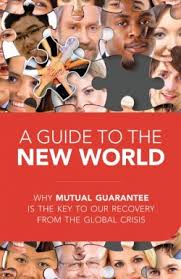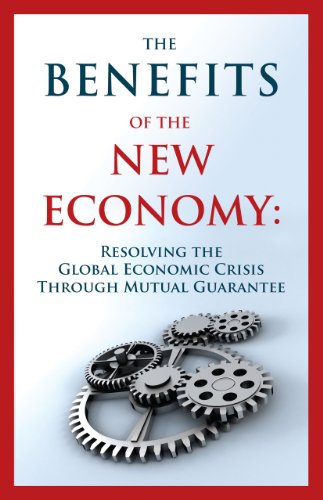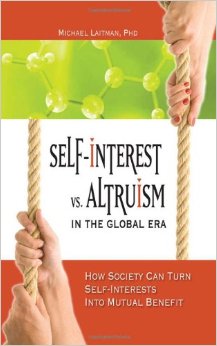Books
 A Guide to the New World:
A Guide to the New World:
Why mutual guarantee is the key to our recovery from the global crisis
Why does 1% of the world population own 40% of the wealth? Why are education systems throughout the world producing unhappy, poorly educated children? Why is there hunger? Why are food prices rising when there is more than enough food for everyone? Why are there still countries where human dignity and social justice are nonexistent? And when and how will these wrongs be made right?
In 2011, these questions touched the hearts of hundreds of millions the world over. The cry for social justice has become a demand around which all can unite. We all long for a society where we can feel safe, trust our neighbors, and guarantee the future of our children. In such a society, all will care for all, and mutual guarantee – where all are guarantors of each other’s well-being – will thrive.
Despite all the challenges, we believe that change is possible and that we can find a way to implement it. Therefore, the book you are holding in your hands is a positive, optimistic one.
We now have a unique opportunity to achieve global transformation in a peaceful, pleasant manner, and A Guide to the New World tries to help us pave the way toward that goal.
The book is divided into two parts, plus indices. Part One contains the concept of mutual guarantee. Part Two details the building of the new mutual guarantee society, and recaps the principles presented in Part One. The indices contain previous publications of the ARI Institute detailing its social, educational, and economic ideologies.
Read Review by Barry Silverstein at ‘Foreword Reviews’
 The Benefits of the New Economy:
The Benefits of the New Economy:
Resolving the global economic crisis through mutual guarantee
Have you ever wondered why, for all the efforts of the best economists in the world, the economic crisis refuses to wane? The answer to that question lies with us, all of us. The economy is a reflection of our relationships. Through natural development, the world has become an integrated global village where we are all interdependent.
Interdependence and ‘globalization’ mean that what happens in one part of the world affects every other part of it. As a result, a solution to the global crisis must include the whole world, for if only one part of it is healed, other, still ailing parts, will make it ill again.
The Benefits of the New Economy was written out of concern for our common future. Its purpose is to improve our understanding of today’s economic turmoil, its causes, how it can be solved, and its anticipated outcome. The road toward a new economy lies not in levying new taxes, printing money, or in any remedy from the past. Rather, the solution lies with a society where all support each other in mutual guarantee. This creates a social environment of care and consideration, and the understanding that we will rise or fall together, because we are all interdependent.
This book contains thirteen ‘standalone’ essays written in 2011 by several economists and financiers from different disciplines. Each essay addresses a specific issue, and can be read as a separate unit. However, one theme connects them: the absence of mutual guarantee as the cause of our problems in the global-integral world.
You can read these essays in an order of your choice. We, the authors, believe that if you read at least several essays you will receive a more comprehensive view of the required transformation in order to resolve the global crisis and create a sustainable, prosperous economy.
Read Review by Barry Silverstein at ‘Foreword Reviews’
 The Psychology of the Integral Society
The Psychology of the Integral Society
The Psychology of the Integral Society presents a revolutionary approach to education. In an interconnected and interdependent world, teaching children to compete with their peers is as ‘wise’ as teaching one’s left hand to outsmart its peer, the right hand. An integral society is one in which all the parts contribute to the well-being and success of the society. The society, in turn, is responsible and cares for the well-being and success of its elements, thus forming co-dependence. In a globalized and integrated world, this is the only sensible and sustainable way to live.
In this book, a series of dialogs between professors Michael Laitman and Anatoly Ulianov sheds light on the principles of an eye-opening approach to education. Absence of competition, rearing through the social environment, peer equality, rewarding the givers, and dynamic makeup of group and instructors are only some of the new concepts introduced in this must-have book for all who wish to become better parents, better teachers, and better persons in the integrated society of the 21st century.

Like a Bundle of Reeds: Why Unity and Mutual Guarantee Are Today’s Call of the Hour
Like a Bundle of Reeds explains why unity and mutual responsibility can heal our society and mitigate anti-Semitism. Using numerous quotes and references from Jewish sages and historians, the author sheds light on some of the Jews’ most daunting and mystifying questions: What is our role on this planet? Are we truly ‘the chosen people’ If we are, what were we chosen for? What is causing anti-Semitism, and can it be cured?
 Self-Interest vs. Altruism in the Global Era: How society can turn self-interests into mutual benefit
Self-Interest vs. Altruism in the Global Era: How society can turn self-interests into mutual benefit
Self-Interest vs. Altruism in the Global Era presents a new perspective on the challenges currently facing the world. Dr. Laitman shows the reader that the problems of the world are the consequence of humanity’s growing egotism. In that spirit, the book suggests ways to use our egos for society’s benefit, rather than merely for our own self-interest.
The earlier chapters offer a unique understanding of humanity’s existence on this planet and how our collective egoism has influenced the development of our society. By understanding the ego and its origins the reader discovers a new understanding of the global integral existence as the remedy for society’s ills. The final chapters address our current social and political challenges, and explain how we can use our egos to resolve them, rather than continuing the downward cycle that humanity finds itself in.
